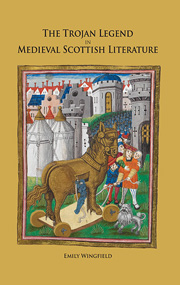Book contents
- Frontmatter
- Dedication
- Contents
- Illustration
- Acknowledgements
- Abbreviations
- Introduction
- 1 Troy in the Older Scots Historical Tradition
- 2 Troy in the Older Scots Romance and Nine Worthies Tradition
- 3 The Scottish Troy Book
- 4 Chaucer's Troilus and Criseyde and Henryson's Testament of cresseid
- 5 Gavin Douglas' Eneados
- Conclusion
- Appendix
- Bibliography
- Index
2 - Troy in the Older Scots Romance and Nine Worthies Tradition
Published online by Cambridge University Press: 05 March 2014
- Frontmatter
- Dedication
- Contents
- Illustration
- Acknowledgements
- Abbreviations
- Introduction
- 1 Troy in the Older Scots Historical Tradition
- 2 Troy in the Older Scots Romance and Nine Worthies Tradition
- 3 The Scottish Troy Book
- 4 Chaucer's Troilus and Criseyde and Henryson's Testament of cresseid
- 5 Gavin Douglas' Eneados
- Conclusion
- Appendix
- Bibliography
- Index
Summary
Compared to the 86 Middle English romances listed in the revised Manual of the Writings in Middle English, the corpus of Older Scots romance appears limited – only twelve Older Scots romances are known to survive. Moreover, whereas three Middle English translations of Guido's Historia exist (the Laud Troy Book, the unrhymed alliterative Destruction of Troy, and John Lydgate's Troy Book), there is only one (now incomplete) Scottish translation of this text, The Scottish Troy Book (discussed in the following chapter).
That said, references to the Trojan legend and its heroes abound in the Older Scots romance corpus. In the romance Roswall and Lillian, for instance, which was most probably composed in the second half of the sixteenth century, the hero Roswall is compared favourably in the poem's opening lines to traditional literary heroes, many from the Trojan tradition:
Princes to him could not compare,
Ulisses nor Ga[u]difere
Achilles nor Troyalus,
Nor yet his father Priamus:
Nore the gentle Clariadus,
Fair Philmox, nor Archelaus,
Nor Florentine of Almanie,
Was never half so fair as he;
Nor knight Sir Lancelot du Lake
In fairness to him was no make.
(lines 15–18f)Further comparisons of Roswall to Hector are made throughout the romance. When Roswall's father believes him to be dead, for instance, he is compared to Priam sorrowing for the death of his son, Hector:
The most worthy king Priamus
In heart was not so dolorous
When stout Hector, his son, was slain.
(lines 102a–102c)- Type
- Chapter
- Information
- The Trojan Legend in Medieval Scottish Literature , pp. 52 - 88Publisher: Boydell & BrewerPrint publication year: 2014



